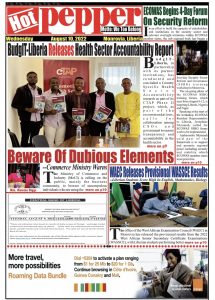BudgIT-Liberia Holds Major Press Conference on Transparency and Accountability in the Health Sector:
Representatives from the Government of Liberia, Civic society organizations, development partners, Members of the press, distinguish ladies and gentlemen.
BudgIT-Liberia in partnership with its partner institutions conducted a Country Specific Health Sector Accountability research as part of our CTAP Phase II project which as part of the recommendations call for Collaboration among CSOs and Government to ensure transparency and accountability in the health sector
Over the years, Liberia has made some little significant progress in the health sector especially in terms of Reproductive, Maternal, Newborn, Child, and Adolescent Health performance. Indicators Show significant gains as those services are now available across the 15 counties despite our research report puts life expectancy rate in the county at 62.5 years (F 66/ M 63 years), and an infant mortality rate of 63/1000 live births. Under 5 mortality is estimated at 93/1000 per births, neonatal mortality rate was 37 deaths per 1,000 live births, and post neonatal mortality rate at 25 deaths per 1,000 and maternal mortality is reported at 661/100,000 births.
BudgIT-Liberia through her research report realized that the top causes of death in Liberia include malaria, diarrheal diseases, neonatal disorders, lower respiratory infections, ischemic heart disease, HIV/AIDS, stroke, tuberculosis, cirrhosis and other chronic liver diseases and maternal disorders. This has shown a total breakdown in the health system of Liberia.
The ministry of Health is clothed with the responsibility for the formulation, implementation, monitoring and evaluation of health policies, plans and standards; deliver, coordinate the delivery of decentralized medical care in public facilities; develop health manpower; undertake preventive and promote health services including specific health interventions. In addition to the Government functions, there are other key actors in the health sector who play vital roles in the delivery of health care. These actors include the private sector who are either non-profit or for-profit institutions. It is estimated that the combined non-profit subsector provides approximately 47% of the health care in the country while the private for-profit sector provides less than 30%.
Our research report shows that over the years, Low pay and incentives for nurses and doctors have led to almost yearly strike actions staged by the National Health Workers Association of Liberia. The most recent strike was called because of decreases in salaries caused by the government’s salary harmonization policy affecting all public sector workers in the country, the need for government to address salary disparities, constant deduction of salaries, and low or little salaries for healthcare workers.

Hence, BudgIT-Liberia is recommending that:
The government of Liberia through the ministry of health collaborate with CSOs and other development partners to put strong institutional measures in place to ensure there’s proper Transparency and Accountability in the Health Sector as the Pro poor Agenda for Prosperity and Development (PAPD).
The government needs to revamp the health sector investment plan with specific focus on addressing issues in the Liberia Demographic and Health Survey: with health authorities and CSOs admitting that the office of financial management needs to be more inclusive when developing annual budget proposals to target priority needs
Improve Health Service Delivery in the Country by providing all necessary resources to properly operate which the Legislature must appropriate adequate relevant budgets and demand periodic reports on budgetary implementation. The Legislature also needs to work closely with audit agencies to ensure that their findings are taken seriously by the Ministry of Justice for prosecution.

Introduce Compulsory Health Insurance for all Public Sector Workers.
The private sector can contribute its support to healthcare in the country through the mobilization of private resources to invest in the health sector. Given the infancy nature of Liberia’s healthcare system, investing in modern medicine and delivery and yield high profits for the private sector and lead to more money staying in the country that would otherwise have been used outside the country in pursuit of medical care.
Government also needs to support the Ministry of Justice to prosecute the accused. Most times, when persons are accused in audit reports, they get to remain in the position whilst defending themselves sternly in the media against “witch-hunt.”
Notwithstanding; The executive needs to muster the political will to clamp down hard on health sector corruption to ensure that already scarce resources are effectively utilized.
With these key recommendations; we want to extend our heartfelt thanks to the legislature for granting the LACC prosecutorial power
